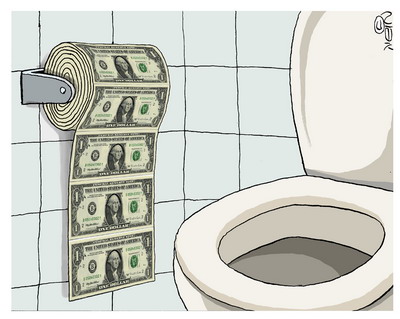
They say such nice things about people at their funerals that it makes me sad to realize I’m going to miss mine by just a few days.–Garrison Keillor
Preparations for a funeral
Having trained staff on call is one reason fixed costs are high for a funeral home. As you see here, my funeral preparations are wrenching.
That’s not my father: http://www.youtube.com/watch?v=iSng37NIbjw&feature=related
The coffin moved: http://www.youtube.com/watch?v=h4vxCq_-fzs&feature=related
Mental Fitness Test
My readers aced the quizzes. My choices were too easy but the exercises might have given you an inkling of how our minds work. Answers and follow-up below:
Listen to your intuition and solve the problems as quickly as you can—instantly or in under 2 seconds!
Quiz 1: A bat and a ball cost $1.10. The bat costs one dollar more than the ball.
How much does the ball cost? ANSWER: 0.05
Ball = x
Bat = x+1 total $1.10, so 2x + $1 = $1.10 or 2x = $1.10 – $1.00 = $0.10 or X = $0.10/2 = $0.05
Usually people reflexively say $0.10 giving a total of $1.20.
Quiz 2: Try to determine if the argument is logically valid. Does the conclusion follow from the premises? Yes or No? No. The argument is flawed, because it is possible that there are no roses among the flowers that fade quickly. A plausible answer comes to mind immediately. Overriding your intuition requires hard work–the insistent idea that “it’s true, it’s true!” makes it difficult to check the logic and most people do not take the trouble to think through the problem.
All roses are flowers.
Some flowers fade quickly.
Therefore some roses fade quickly
The quizzes and answers came from the book, Thinking, Fast and Slow by Daniel Kahneman, winner of the Nobel Prize in economics. See if you can borrow a copy from your local library. The book teaches you about the danger of jumping to conclusions, not thinking a problem through, and we often confuse luck with skill. I am disappointed to learn that I am not 30% smarter than last July just because the market has risen. Damn!
At first I was skeptical, but this book deals with the research on how fast thinking (largely intuitive) and analysis (slow thinking) interact. Intuition is automatic and instinctive; therefore much of it is hard-wired. It can somewhat be controlled by the analysis (slow thinking) but the analysis side will draw from it often. While the book mainly is concerned with how these systems can lead us into faulty thinking, it also has a sub-plot on how to make your side of the story more persuasive. These systems rely on each other much more than was previously thought, often at the wrong time or too much weight from one or the other. Sometimes this is automatic, such as fear, other times there is simply “lazy” thinking, one system imput is given too much weight because it is easier or has become a habit.
Kahneman podcast:http://www.thoughtleaderforum.com/default.asp?P=909655&S=945705
Transcript of the podcast:http://www.thoughtleaderforum.com/957443.pdf
Summary notes:
- It strives to provide a deeper understanding of judgments and choices by humans.
- It fully documents the biases of intuition (judgment informed by past cases)
- It documents the fact that decision-making under uncertainty leads to humans being too prone to believe findings based on inadequate evidence, and too prone to avoid collecting a sufficiency of observations or research findings by others.
There is a distinction between System 1 and System 2.
System 1 is automatic, fast, and falls prey to illusions.
System 2 is controlled, slow, requires attention, and is easily distracted.
Conclusions about judgment heuristics (rules of thumb):
HARD to think statistically. EASY to think associatively
We have EXCESS CONFIDENCE in what we think we know, and a deep, deep, deep inability to acknowledge our ignorance.
Humans DEVIATE from rational model with two major CORRUPTIONS:
- Treat problems in isolation instead of as part of a systemic whole
- Treat problems in relation to framing effects that distort perceptions with inconsequential trivia
QUOTE (34): We found that people, when engaged in a mental sprint, may become effectively blind.”
All should be forced to engage outside the box. All analytic teams need an independent Yoda to challenge them.
The author emphasizes that hypotheses should be confirmed by trying to REFUTE the hypothesis rather than by searching for additional supporting evidence. Having the hypothesis is enough. If it cannot be refutes, THAT is worth much more than a documented but not seriously challenged hypothesis.
QUOTE (117): The tendency to see patterns in randomness is overwhelming.
The book could have been shorter, but you learn more about the flaws and traps in your thinking.
Another Quiz
Since the prior two quizzes were so easy try this: Multiply two, three-digit numbers together. Hard but you can do it. Now do this while multiplying two different three-digit numbers together. http://www.youtube.com/watch?v=H8f8drk5Urw
Our minds have limited capacity. Eliminate the clutter and stay focused on one problem at a time; don’t multi-task.
Good luck in your learning.







